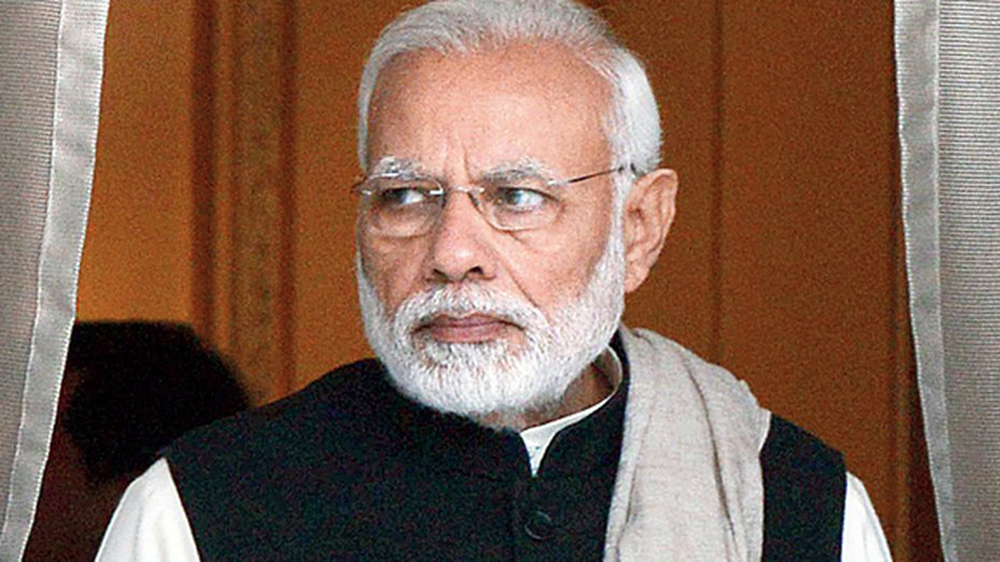Prime Minister Narendra Modi on Tuesday held a meeting with National Security Adviser Ajit Doval, Chief of Defence Staff General Bipin Rawat and the three service chiefs with a focus on bolstering India’s military preparedness amid escalating border tension with Chinese troops in Ladakh, government sources said.
The military brass is learnt to have apprised Modi about the evolving situation in eastern Ladakh, though officials maintained that the agenda of the pre-scheduled meeting was to discuss the ambitious military reforms and ways to boost India’s combat prowess.
The meeting came hours after the top four generals briefed defence minister Rajnath Singh about the situation in Pangong Tso, Galwan Valley, Demchok and Daulat Beg Oldi where the Indian and Chinese troops have been engaged in aggressive posturing for the past 20 days.
Sources in the military establishment said the Prime Minister was briefed about the situation in Ladakh. There was no official comment or details available about the meeting.
Official sources said NSA Doval had been closely monitoring the evolving situation along the LAC in Ladakh as well as in north Sikkim and Uttarakhand.
“China’s strategy to put military pressure on India will not work. We want restoration of the status quo along the LAC,” said an official on the condition of anonymity.
In the meeting, the top military brass is learnt to have apprised Modi about the implementation of key infrastructure projects along the LAC, the de facto border with China.
Official sources said India would not stop infrastructure development projects in strategic areas along the nearly 3,500km Sino-Indian border, notwithstanding China’s well-coordinated efforts to stall them by attempting to vitiate the situation in areas like eastern Ladakh.
It is learnt that the defence minister has already conveyed to top military brass that there was no need for reviewing the implementation of any of the key projects along the LAC in Ladakh, Sikkim, Uttarakhand or in Arunachal Pradesh.
In view of the nearly 20-day standoff between the two sides, the Indian Army has significantly ramped up its presence in sensitive border areas in north Sikkim, Uttarakhand and Arunachal Pradesh, besides Ladakh, to send across a message that India will not be wilting under any aggressive military posturing by China, the sources said.
The Chinese side has been particularly peeved at India laying a key road in the finger area of Pangong Tso region besides another road connecting the Darbuk-Shayok-Daulat Beg Oldie road in Galwan Valley.
The situation in eastern Ladakh deteriorated after around 250 Chinese and Indian soldiers were engaged in a violent face-off on the evening of May 5 which spilled over to the next day before the two sides agreed to “disengage” following a meeting at the level of local commanders.
Over 100 Indian and Chinese soldiers were injured in the violence.
The trigger for the incident was China’s strong objection to the road being laid by India in the Finger area in Pangong Tso.
The incident in Pangong Tso was followed by a similar incident in north Sikkim on May 9.
Since then, Chinese military has increased its strength in Pangong Tso, Galwan Valley, Demchok and Daulat Beg Oldi, and resorting to “aggressive patrolling” in these areas.
The Indian Army is also carrying out a similar exercise in the region, sources said.
New Delhi last week said the Chinese military was hindering normal patrolling by its troops and asserted that India has always taken a responsible approach towards border management.
At a media briefing, external affairs ministry spokesperson Anurag Srivastava also strongly refuted China’s contention that the tension was triggered by trespassing by Indian forces on the Chinese side.
India’s response came two days after China accused the Indian Army of trespassing into its territory, claiming that it was an “attempt to unilaterally change the status” of the LAC in Sikkim and Ladakh.
In the meeting with the Prime Minister, sources said, General Rawat apprised him about the implementation of the recommendations by the Lt Gen. (retd) Shekatkar committee for military modernisation.
The government has accepted almost all recommendations of the panel, including ways to bolster border infrastructure.










